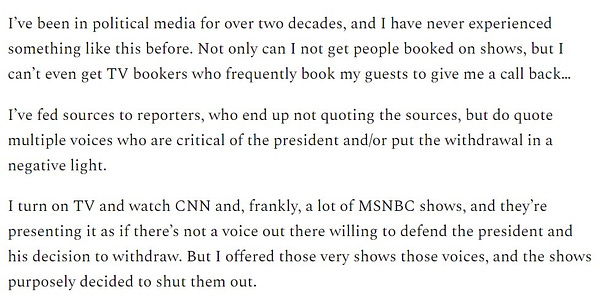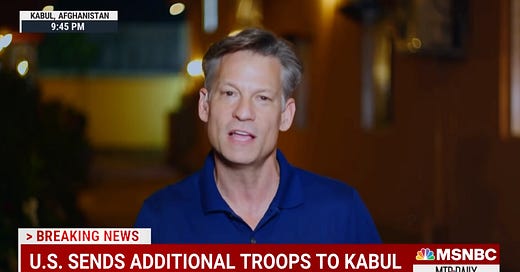The Media Is In a World of Its Own on Afghanistan
Americans overwhelmingly oppose the war—but you'd never know that from the media coverage this past week.
You could be forgiven for assuming from the tenor of much of the media coverage this week that just about everyone thinks that the war in Afghanistan was a noble humanitarian effort that has ended in tragedy thanks to the shameful miscalculations of Joe Biden. The airwaves have been flooded with a seemingly unending string of military men, hawkish politicians, and journalists determined to cement a narrative of a good war undone by bad decisions at the top. Reporters have angrily wondered why the White House wasn't contemplating a presumably indefinite military presence in Afghanistan, or even in countries surrounding Afghanistan. Surely these people must be representing a constituency besides, well, themselves?
Well, perhaps not. A poll out today from the Associated Press tells quite a different story:
A significant majority of Americans doubt that the war in Afghanistan was worthwhile, even as the United States is more divided over President Joe Biden’s handling of foreign policy and national security, according to a poll from The Associated Press-NORC Center for Public Affairs Research.Roughly two-thirds said they did not think America’s longest war was worth fighting, the poll shows.
This finding is consistent with other polls asking specifically about the withdrawal of troops from Afghanistan. Data for Progress, for instance, found that voters supported withdrawal by a 51-37 percent margin. Politico and Morning Consult asked the same question and found voters in favor by 49-37.
That number, Morning Consult noted, represents a very steep drop—a full 20 points—from the last time it asked about the withdrawal in April. That is not especially surprising; it would be hard to look at the chaos and tragedy playing out in Afghanistan and not conclude that something had gone awry, even if you still supported the move. But it is significant that, even with the relentless drumbeat of negative news, media coverage, and partisan attacks, most Americans still want to get out of Afghanistan, and the vast majority of them think the war wasn't worth it—which it very clearly was not.
You would think that this viewpoint would be more fully represented within the upper echelons of our elite media, but our biggest journalists appear to be operating in a world of their own. What's worse, there are reports that the very widespread view that the war in Afghanistan was fundamentally wrong is being deliberately excluded from the mainstream debate. Here's journalist Judd Legum:


This is scandalous on its face, but it should also trouble anyone who laments the lack of trust that Americans have in their media. Why should people put their faith in an industry that is so blatantly insulated within its own universe? Why should people support elite media figures who work so hard to continue a war that almost nobody but them wants to carry on? When the most powerful journalists in America make it so clear that they are working only for themselves, what is the point of them?
I am not suggesting that journalism function as a kind of direct democracy, where any view that attracts significant support must be rigidly reflected back to the world by reporters and anchors. Lord knows that someone with my views wouldn't last too long under that system. But there is virtually no other issue in the world where the elite media thinks it's permissible to shut one side out of an argument so comprehensively. Even Nazis get an airing! It's only when talk turns to war, violence, and empire that any pretense of debate falls away, even when all the evidence suggests that journalists are reflecting a relatively tiny sliver of opinion. A less insular elite would possibly try to change this pattern, but I wouldn't hold my breath waiting for these people to figure out what they're doing wrong.





